Student Engagement Steadily Increasing
Title: Engagement Insights: Survey Findings on the Quality of Undergraduate Education
Source: National Survey of Student Engagement
Results from the spring 2019 National Survey of Student Engagement (NSSE) suggest positive increases in student engagement on campuses nationally. Designed to gauge the extent to which students are engaging in activities that support and promote learning and development, the results of the 2019 survey are based on first-year and senior students at 531 participating institutions. Specifically, the survey examines elements related to student engagement, retention, and persistence.
The 2019 results show a 10-percentage point increase in the number of students who reported having conversations with faculty and instructors that extended beyond coursework, compared with respondents from the 2004 NSSE survey. First-year students in particular increasingly report speaking with their faculty about coursework outside of class and career planning topics. Additionally, 55 percent of seniors in the 2019 survey identified the institutional emphasis on diverse interactions as ‘substantial,’ compared with 43 percent of 2004 respondents. These increases held across student groups with 10 percentage point increases for both first-year and senior students.
The NSSE brief provides an overview of student engagement trends over time, highlights select institutional results, and provides an overview of how institutions can use the data to develop actionable items and initiatives. The full results report also contains resource pages for institutions to promote engagement efforts.
For the full 2019 NSSE report, please click here.
—Charles Sanchez
If you have any questions or comments about this blog post, please contact us.


